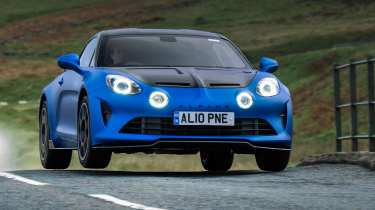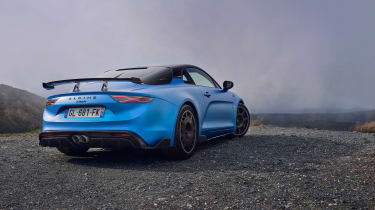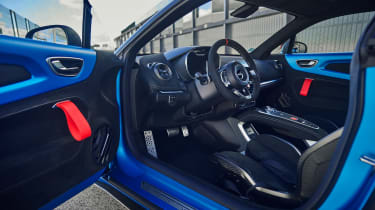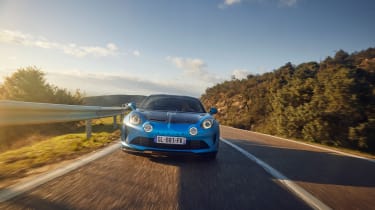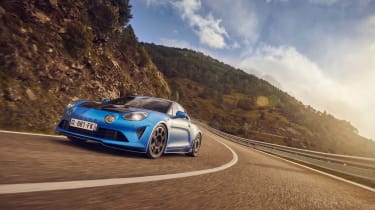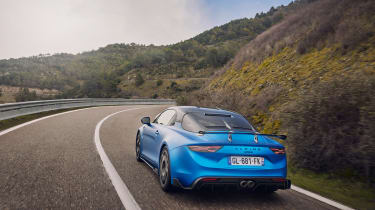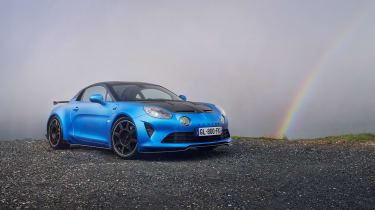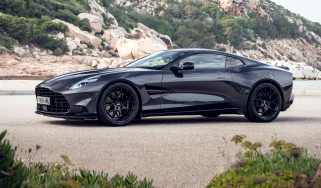Alpine A110 R 2024 review: still want that Cayman GT4?
Designed for the track the new A110 R takes the brilliant lightweight package and makes it more focussed than ever. But is it a better road car as a result? Richard Meaden finds out.
Less is more. At least that’s the gospel we preach when it comes to sports cars. Right now, there’s no better example of this minimalist mantra than the Alpine A110, for at a time when hybrid-powered SUVs are approaching 3 tons and BMW M3s are getting on for 2 tons, this delicate and delectable machine can tip the scales at a barely believable 1102kg.
Such skeletal mass seems nothing short of miraculous, but Alpine has pushed things even further with the new track-focused A110 R, trimming that figure down to 1082kg in the pursuit of performance. It’s testament to the famous French marque’s fastidious approach that such weight savings have been made on an already featherweight car. Indeed, the only heavyweight part of the A110 R is its £89,990 price tag, but even this is a bullish indication of the fervent following that exists within Alpine’s growing global fanbase.
The formula for the A110 R’s impressively shredded physique is a high-fibre diet. Carbonfibre to be precise, the expensive and exotic material being employed extensively across new and highly effective aero parts, plus the bonnet, roof, engine cover (meaning there’s no rear window), seats and even the wheels. The resulting look is reminiscent of the Weissach Pack offered on Porsche’s RS models, with large areas of unpainted bodywork giving the normally chic-looking A110 a suitably skunkworks vibe.
More reviews
Group tests
In-depth reviews
Reviews
Unashamedly aimed at circuit use, Alpine describes the R as an A110 that’s ‘dedicated for the track and useable on the road’. For context, it describes the A110 S as ‘sporty on the road and credible on track’. It’s an important distinction, because it frames the R as a car that promises to be scintillating around a racetrack but possibly compromised on the street.
The chassis upgrades certainly speak of a car targeting outright pace, with coilover suspension that uses ZF dampers, Eibach springs (10 per cent stiffer and now employing main and helper springs for the first time in order to save some weight) and new bump stops made by BASF.
With 20 clicks of combined bump/rebound damper adjustment and ride height settings that drop the R by 10mm for road use and 20mm for track, there’s plenty of scope for set-up tweaks. Completing the hardware changes are stiffer anti-roll bars front and rear (by 10 and 25 per cent respectively), plus a set of sticky semi-slick Michelin Pilot Sport Cup 2 tyres wrapping those carbon rims, which themselves save 12.5kg in total.
Given its track bias there’s a similarly extensive aero upgrade, with a new front splitter, side skirts, rear wing and diffuser upping the downforce levels and altering the aero balance. This balance has been shifted rearwards to aid high-speed stability, while drag has been reduced by the integration of air intakes in the carbon bonnet amongst other wind-cheating mods.
Top speed is 177mph, up 6mph over the A110 S, with 0-62mph arriving in 3.9sec, 0.3sec sooner. The 320mm Brembo brakes are the same as those fitted to the A110 S and GT, but cooling has been improved by 20 per cent thanks to some neat (and patented) airflow management that reduces peak disc temperatures by up to 90deg C. The ESP system has been tuned to suit the R’s increased grip levels and altered balance, while the carbonfibre wheels – made with a more repeatable, less laborious industrialised manufacturing process than that used for many such items and handled by aerospace supplier Duqueine – feature bonded structural facings (don’t call them wheel trims!) that differ from front to rear axle, each design optimised for cooling and reduced drag.
Inside it’s a blend of familiar A110 design and dedicated R items. Foremost amongst the latter are the Sabelt single-skin carbon seats. Featuring strategically positioned pads attached with Velcro, they are very supportive and – perhaps surprisingly – extremely comfortable. Six-point harnesses are also standard. Few things boil the contents of my bladder faster than race belts in road cars, especially when there’s no inertia reel fitted as an alternative, but I’ll concede they’re a statement of intent and bring added safety for track use.
Perhaps the biggest area of contention is the 1.8-litre 296bhp turbocharged four-cylinder engine, as it’s the same unit used by the A110 S and GT and is one of the few areas of the R to remain unchanged. Alpine rightly contends that efficient performance through lightweight construction and slippery aerodynamics is integral to the brand’s DNA, but reading between the lines if it weren’t for the punitive CO2-related tax applied to high-performance cars in France, you sense the R would have had its wick turned up to further boost its performance and sweeten the substantial price hike.
Driving on a racetrack tends to suck the speed out of all but the most powerful cars. Sadly, it proves to be the case with the A110 R. Given the launch venue is Jarama, near Madrid, this is a little surprising, as it’s not an expansive 21st-century circuit evolved for modern slick-and-wings race cars. Built in the late 1960s and designed by the late John Hugenholtz – who also penned Suzuka and the original Zandvoort circuit – Jarama’s compact layout lends itself to street cars thanks to a sinuous mix of corners, sizeable gradient changes, a long, swooping main straight and plenty of big braking areas. The new Alpine doesn’t feel lost here, but it does feel a little lacking between the corners.
Balance-wise the A110 R is resolutely stable. If anything it’s too keen to run its nose wide in slow- and medium-speed corners. Fast corners are its forte, but it seems that in controlling the A110’s tendency to roll into oversteer, and trimming out the front-end downforce so it’s not too pointy in high-speed corners, the R has sacrificed the playfulness of its siblings without gaining the kind of aggressively grippy front end that would feel like a fair trade.
It took every trick in the book to make it slide for our photos, and while that’s overly reductive in terms of measuring the R’s capabilities, it does point to a car that’s very prescriptive in the way it wants to be driven. Given its commitment to delivering a definitive trackday experience, not to mention the abundant character of the base car, the R feels a bit one-dimensional.
A little over an hour from Jarama are some great routes that wind through the Sierra de Guadarrama. I’ll confess to some trepidation as we drive out of the circuit, as the tone of the press conference suggested the A110 R might have prioritised lap times over on-road prowess. Given it’s not quite the weapon we’d hoped for on track, that could make for a double disappointment.
It doesn’t take long to realise the unease might have been misplaced, for despite the obvious increase in spring rates, damping control and resistance to roll, there’s an underlying pliancy that suggests the R will shine on decent roads. Better, whatever the road on which you’re driving, be it motorway or mountain switchbacks, the R feels more of an event; special in unexceptional circumstances and more charismatic when experienced away from the singular challenge of a racetrack.
Once we reach the mountain roads the R ups its game, feeling keener and more energised than any A110 before it. Unlike a circuit, where you can rapidly find and ultimately breach the limit of grip and have the space and freedom to accelerate through the gears with everything the R can muster, the public road presents more fleeting opportunities to uncork its performance and feel it come alive.
With greater body control and grip the R revels in direction changes, its appetite for apices matched only by the enthusiasm with which it surges between corners and the self-assured way in which it dives into braking areas. There’s a confidence about the R that gives you tremendous encouragement, and a deftness of touch that provides sensory confirmation that this is indeed a lightweight sports car that’s far from light on feel. Few if any new cars on sale today feel quite like this.
These Spanish roads are smoother than British equivalents – then again so are most mogul fields – so we’ll still have to reserve final judgement until we try an A110 R in the UK. What’s important to remember is that those ZF dampers offer a broad range of adjustment. We drove with them set on 9 clicks, which leaves 11 more to play with before the R is in full soft. This bodes well for our shamefully bumpy A- and B-roads back home.
Away from the racetrack the powertrain is more enjoyable, too. With a little over a ton to propel, 296bhp and 251lb ft equate to healthy power- and torque-to-weight ratios, and because road driving sees you spending more time in the meat of the midrange you get to enjoy the carefully optimised – but not synthesised – soundtrack that has a pleasingly gutsy growl under load and exhales through a new 3D-printed twin-wall tailpipe.
The fruity paradiddle of pops and bangs on the overrun can get tiresome if you’re on a road that has you repeatedly on and off the throttle, but as turbocharged four-cylinder engines go it’s characterful enough. Just don’t spend too long considering the kind of engines £90k can buy you access to on the used market.
Pace-wise you never feel truly pinned into the seat when accelerating through the gears, but on the kind of road that sees you working between 30mph and, ahem, a little shy of three-digit speeds, the A110 R romps along very nicely indeed, the firm brake pedal encouraging you to brake late and deep and the snappy DCT gearshifts punching up and down the ratios with crisp urgency. It’s in these moments that the R driving experience really crystallises.
As well it needs to, for the A110 R is big money, especially if you do the £-per-bhp maths. You can buy plenty more bang for your buck new or used, but if you love purity and obsessively detailed engineering then there is much to celebrate in this car. Rare and exotic with admirable authenticity and an unmatched kerb weight, it’s got true star quality.
Does it deliver on its promises? If you approach it with your eyes open then yes, but also no. This is a very particular take on the track-focused sports car, one that majors on the cumulative effect of marginal gains and demands you look beyond raw performance and dry-mouthed thrills.
If you have plenty of hours in big-power machinery and enjoy the palm-moistening challenge of managing mass and balancing grunt against grip, then the A110 R isn’t for you. It’s too well within itself and won’t deliver the fireworks you’re after. What it delivers in abundance is transparency and precision, which in turn gives you immense confidence and huge reserves of chassis performance to explore. It’s a zero-jeopardy track car that flatters less experienced hands yet will also carry serious pace if you are happy to drive to its limits.
Ironically it shines more brightly on the road, where the tighter body control and increased sharpness make it a dazzling partner, whether the road is fast and flowing or tight and technical. It’s a more cerebral sports car, one that excels under braking and loves stringing sequences of turns together as only a car liberated from the limitations of inertia can.
Yet ultimately, no matter how obsessive the engineering and impressive the weight savings, they can’t compensate for a powertrain that could do with a bit more go. Clever tweaks to the exhaust and induction system have brought more breadth and volume to what you hear – especially under load – but there’s no ignoring it lacks aural sparkle. The chassis and aero improvements are meaningful, but it’s crying out for the engine performance to stretch it.
On the positive side, being so light the A110 absolutely makes the most of what power and torque it has got, but this makes it impossible not to imagine it with more. I have no doubt many owners of the R will resort to aftermarket tuners to do just that; UK-based Life110 offers a 280lb ft remap (an increase of 29lb ft) while Litchfield goes further with 306lb ft and an accompanying 10bhp lift. Each makes a meaningful difference, largely because you can take most corners a gear higher, but you shouldn’t have to take a car like this to a tuner in order to realise its full potential.
Unfortunately for Alpine, in getting the basic A110 so right, any deviation from that perfect recipe inevitably steers away from the sports car sweet spot it has come to call its own. The R is admirably true to the company’s long-standing ethos of finding speed through efficiency and will undoubtedly have tremendous appeal to those for whom less really does equal more. But in an age where bhp and lb ft are the dominant currency, unchanged power and torque outputs are a hard sell. Especially when the price premium is £28,000 over an identically powerful A110 S or GT.
Ultimately the R leaves us conflicted. By tightening its focus and sharpening its dynamics Alpine has elevated the A110 on-road driving experience to a new level. But if you judge it on its racetrack performance – where it was designed to excel, after all – it is less of an event. We still love the A110 and admire the R for what it represents, but despite the meticulous approach and compelling cool factor, it’s a car for purists and brand fanatics only.
Why it made eCoty 2023
Don’t worry if you have lost track of Alpine’s A110 model line-up. It has multiplied by a factor that even Porsche’s 911 product planners would consider a little enthusiastic. First there was Pure, Première and Légende, then came S, GT and one called simply ‘A110’, and that’s not to mention the specials that have come and gone, such as the Le Mans Edition and the Jean Rédélé Edition and that one that was painted yellow.The R is different. Special, yes? But also the epitome of what Dieppe can achieve when the only consideration is taking the already featherweight A110 and adding more lightness.
It’s a car that initially impressed us more on road than track, and did so again when we pitched it against Porsche’s Cayman GT4 and BMW’s M2 on Scotland's finest roads and Anglesey Circuit (evo 312). It’s also a car that has frustrated on some drives yet inspired us on others, the latter truer to its character.
It arrives with some baggage, some familiar, some pieces new and shining. The familiar is its four-cylinder turbocharged powertrain and dual-clutch transmission that distracts you more than it should. The new is the price, all £96,990 of it, which positions the R fairly and squarely in the ‘this needs to perform above and beyond to pull something spectacular off’ category.
It also has two considerable-sized gems tucked up its wheel arches to counter: a 1,082kg kerb weight and a marathon runner’s physique, two attributes that few here, or anywhere, can match and that get to the heart of what makes a great driver’s car. A potential eCoty winner, two.
You can read evo's 2023 Car of the Year feature by picking up a copy of issue 317 via the evo shop.
Specs
| Engine | In-line 4-cyl, 1798cc, turbocharged |
| Power | 296bhp @ 6300rpm |
| Torque | 251lb ft @ 2400-6000rpm |
| Weight | 1082kg (278bhp/ton) |
| 0-62mph | 3.9sec |
| Top speed | 177mph |
| Basic price | £89,990 |
